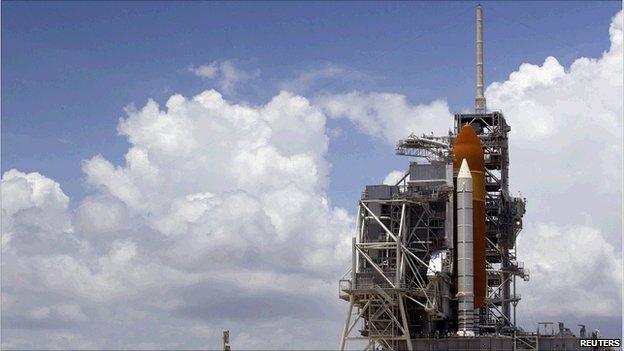Weather looks worse for shuttle Atlantis
- Published

A very pleasant day on the Space Coast but poor weather is moving Kennedy's way
Weather remains the primary concern ahead of Friday's planned launch of the last shuttle mission.
The Atlantis orbiter is due to lift off at 1126 local Florida time (1526 GMT) on a mission to haul critical supplies to the International Space Station.
But forecasters believe there is a 70% chance now that stormy weather will prevent the shuttle getting away on time from the Kennedy Space Center.
Nasa officials say they will continue with the countdown nonetheless.
"The weather is the weather," said Mike Moses, the chair of the mission management team, recalling worse forecasts in the past that ultimately did not hold up the flight.
"It could be pouring with rain everywhere else in the county but if we get that hole in the right spot at the right time, we can go. I'm feeling pretty good about trying Friday," he told BBC News.
Crowd issue
Playing on managers' minds are the huge crowds expected on the Space Coast to view the final ascent in the 30-year shuttle programme, and the impact that mass of people could have on launch operations.
Local police expect half-to-three-quarters of a million people to try to get near the spaceport to take up a good vantage point.
But if a delay is called because of the weather or a last-minute technical gremlin then launch teams might find it hard to get home for sufficient rest before returning to the spaceport to resume the countdown.
In that case, a "scrub" might prompt managers to simply skip a day and call the second attempt for Sunday. That would provide everyone with more time, but its added bonus would be that the weather looks better the deeper the forecasters look into the weekend.
There is a lot of attention on the Atlantis launch because of its historical significance and calling the fickle atmospheric conditions in these parts is going to be a tough job.
"I wouldn't call it pressure; I'd call it exciting," said shuttle weather officer Kathy Winters.
Full of food
Four astronauts will ride Atlantis to orbit - Commander Chris Ferguson, Pilot Doug Hurley, and Mission Specialists Sandy Magnus and Rex Walheim.
The primary task of their 12-day sortie is to deliver more than 3.5 tonnes (8,000lb) of supplies to the ISS. A third of the load is food and it will ensure the platform has a year's worth of consumables aboard to sustain its residents.
Friday's ascent would be the 135th and last shuttle launch. It will be the 33rd lift-off in the career of Atlantis.
Nasa is committed to ending its shuttle programme because the vehicles are too costly to maintain. The agency believes a more affordable approach to getting astronauts to the ISS can be achieved by contracting out their transport to private companies.
The first of these commercial carriers is expected to enter service sometime in the middle of the decade.
End preparation
It does mean, however, that a lot of people on the Space Coast will lose their jobs as a consequence.
Shuttle staff numbers are already down to 5,500 from a programme high of 18,000.
Launch director Mike Leinbach said people were dealing with a difficult transition process.
"Inside the space centre, it's going to be significantly different; we'll be preparing for the next programme and hopefully we'll get definition on that relatively soon.
"I'll tell you, it's getting more and more sombre the closer [we get to the end of the shuttle], but that doesn't detract from the professionalism and cohesiveness of this team that I've grown to love so much over the years."
Leinbach said they would celebrate a successful ascent, whenever it occurs, with some speeches over a meal of beans and cornbread.